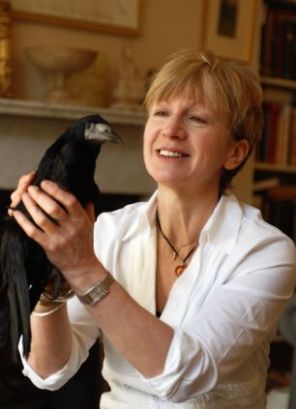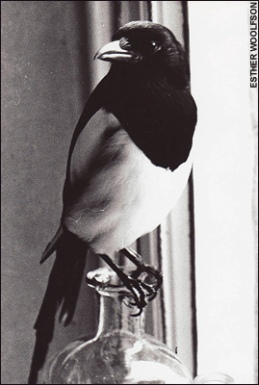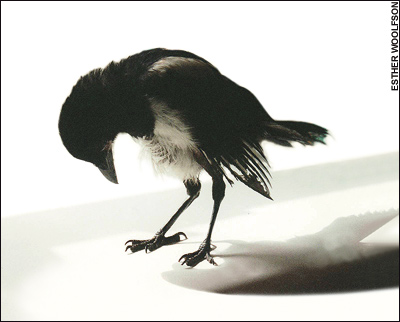It was 2008 when I read Esther Woolfson’s first book Corvus: A Life with Birds and was enchanted by her observations of birds, both ‘tame’ and wild. Her writing is crisp and observant, never sentimental, yet full of feeling. Through her eyes, we felt the gift that her birds are and felt with her their loss. As I was writing my own book that features birds, I often thought back to Chicken, Ziki and Spike and the avian friendship that they and Woolfson shared. So I was very excited to hear that she had a new book coming out this year – Field Notes from A Hidden City: An Urban Nature Diary.
In it, Woolfson explores a year up close of the urban nature around her home city of Aberdeen, looking closely and thinking deeply at those animals that are the closest thing city-dwellers come to nature. She mediates on the intersection of urban lives with rats, slugs, starlings, rooks, squirrels, foxes and jackdaws using the Taoist principle of wu-wei, or ‘masterly inactivity’. She questions our prejudices and folkloric distrust at some animals and apparent regard for others. With a philosopher’s art, she also examines what it is to be human when one regards the actual prescience of animals we thought had none. The chapter on the late fledged Jackdaw a perfect microcosm of what it is to love wild things, yet to be apart from them.
Field Notes from a Hidden City is a lyric and sometimes haunting read.
Esther kindly shared some thoughts with me about her new book and her special relationship with birds.
Sandra, I’m delighted to be doing this interview—thank you so much for asking me.
My new book, ‘Field Notes From a Hidden City’ is— on one level— an account of a year in the natural life of the city where I live, Aberdeen in the northeast of Scotland. On another level, it’s an examination of our feelings and attitudes towards the species with whom we share cities and takes the form of a diary, interspersed with discrete chapters about particular species and ideas. I look at the lives of city birds such as sparrows, gulls, pigeons and starlings and at creatures humanity tends to dislike, such as rats, spiders and slugs. I write about climate and latitude too, about invasive species and our attitudes towards town and country.
My dear old companion, Chicken the rook, is 25. She’s fine although her eyesight is less acute than it was. She’s still vocal and friendly and delightful. Ziki, my young crow is now a sturdy, large and very beautiful bird. He’s still nervous and I suspect that that will always be the case because of the circumstances of his youth. He found a voice after about a year and is a very vocal bird now with the full range of crow sounds. He loves music and has his own radio and CD player (operated alas, by me. I’m sure a corvid could learn to do it, given time.) He’s devoted to his rubber mice (which I now buy at Hallowe’en-they’re sold as scarey items for children. The very delightful man who translated ‘Corvus’ into Brazilian Portuguese, sent me a whole consignment of mice of all sorts and colours for the birds to play with.) He has a collection of polished stones which he moves about from place to place and hides. He looks wonderful and I hope that this is some indication of his general well being.
(I do still have 14 elderly doves-they’re as ever, pottering about, nipping out for a quick whirl round, bathing in the garden in the freezing rain…)
No-one new creatures have come my way because now people tend to phone from walks to tell me that they’ve seen a small bird on the ground and I’m able to tell them that it’s most probably learning to fly, and should be left alone. I would always take in a creature in need— the last one I had dealings with was a very small jackdaw, but alas, he didn’t survive. (There’s an account of him in ‘Field Notes.’)
I wouldn’t call it an experience of augury exactly, but I have had a sense of communication which was quite beyond anything I could have imagined. With Spike the magpie, I often had a sense of the presence of another mind and consciousness, which isn’t as fanciful as it sounds because magpies are such cognitively able and self-aware birds. (Research findings show that magpies are among the very few creatures who can recognize themselves in mirrors—there aren’t many who can—us, some of the higher primates, and magpies.) It has left me with a feeling of deepest respect for these remarkable creatures.
My writing process is very disorganized. I can spend a long time following one idea or researching one small aspect of a topic. Writing’s always a mix of terrific anxiety and great delight—the actual writing is characterized by a mixture of both and by the constant desire to do it better, to make a sentence better, to be lucid, and concise and true.
I always write in my study, the room I share with Chicken (who potters to and fro and will often come to stand beside me as I work.) I can look out at the garden and the birds and hear the sounds of a not-too-noisy city. Towards the end of writing ‘Corvus’, I decided that the ancient, saggy dining chair I used as a desk chair wasn’t doing my back any good and so I bought a lovely comfortable desk chair which makes me feel like a minor tycoon but reminds me too that I’m not, I’m just another wee writer, striving away in a quiet room.
I work on an iMac and am always devoted to the current one as long as it behaves and doesn’t do anything odd to throw me into panic, as these things do from time to time.
I try not to have any superstitions but I’m never certain where adherence to routine blends imperceptibly into superstition…
The whole process of writing is fairly slow for me, or I think it is but considering that some people take ten years to write a book, perhaps it’s not. I’ve always envied people who can write incredibly quickly but I just don’t. Having said that, I’ve had to learn to respond quickly to requests for pieces—it’s just part of being professional—or trying to be.
The main books of my childhood were classics—‘What Katy Did’ and ‘Anne of Green Gables’, “Alice in Wonderland’ etc and I loved the ‘Chalet school’ books which were already out of date when I read them, tales of an impoverished young English teacher who, after their parent’s death, takes her small sister to start a school in the Austrian Tyrol in the years before the Second World War. They were classic school stories in some ways but in others, had a great deal to say about the terrible poverty of parts of Europe after the Treaties of Versailles and Trianon, and the eventual rise of Hitler. My father was a terrific buyer of books and I began to read adult books when I was about eleven—everything from American politics to Mishima and Tanizaki.
I think that every single book one reads influences one’s writing in some way. In choosing what you read, you’re choosing what you’ll write—not in the sense of being derivative but in the general sense of the standards you’re going to expect from your own work.
For years, I wrote fiction, mainly short stories and didn’t really consider writing anything else until ‘Corvus’. (There’s one story on-line, called ‘Chagall’, it’s on the website of the now defunct organization The Scottish Arts Council.) I enjoy writing fiction but realized only after I’d begin writing ‘Corvus’ that I love the research involved in following the obscure by-ways of a topic such as the taxonomy of molluscs or the history of ideas relating to human attitudes to the natural world. I’ve found the scientific aspect of it all entrancing and am now very interested in relationships between the arts and science.
You asked about spending a day with a character from a book—I’ve had such fun with that! My ideas change from minute to minute, from being a child in Avonlea with Anne from ‘Anne of Green Gables’ to wandering the streets of Manhattan with ‘ The Catcher in the Rye’ hero Holden Caulfield. (I’d be the one to understand that his problem was the fact that he hadn’t been able to grieve properly for his brother—we’d talk about it endlessly while wandering the corridors of the American Museum of Natural History…) It’s probably indicative of the kind of books I read, but I’m not sure I’d want to spend much time with many of the characters. I do like Sabine, Parsifal and Phan from Anne Patchett’s ‘The Magician’s Assistant’ though— they sound delightful.
At the moment, I’m writing various short pieces that I’ve been asked to write—various blogs and journal entries and so on. As far as larger projects, my mind’s on it somewhere. I’m always hoping that someone will come along and tell me what to do and then, obediently, I’ll do it but of course it’s never going to happen…
Thanks for sharing your thoughts with me Esther, I know I can’t wait to read what you write next.



